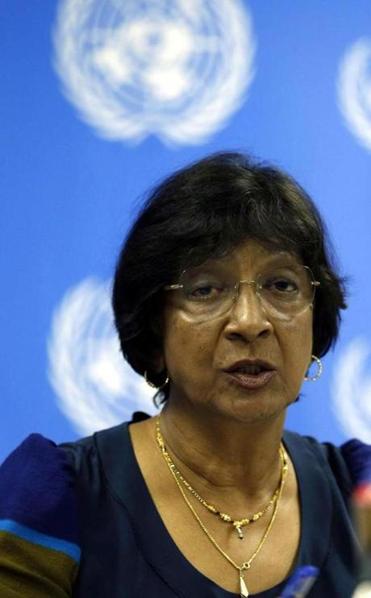
Navi Pillay, of the UN, said Sri Lanka shows signs of going in an “authoritarian direction.”
Video of UNHCHR’s speech, plus Q & A at http://www.dailymirror.lk/news/34698-signs-of-sri-lanka-moving-towards-authoritarianism-pillay.html
Text of UNHCHR’s speech at http://un.lk/news/opening-remarks-by-un-high-commissioner-for-human-rights-navi-pillay/
COLOMBO, Sri Lanka — The United Nations human rights chief chastised Sri Lanka’s government on Saturday, saying it is showing signs of becoming more authoritarian despite the end of the country’s long civil war more than four years ago.
In a hard-hitting statement ending a weeklong visit to assess the rights situation in Sri Lanka, the United Nations high commissioner for human rights, Navi Pillay, said she was ‘‘deeply concerned that Sri Lanka, despite the opportunity provided by the end of the war to construct a new, vibrant all-embracing state, is showing signs of heading in an increasingly authoritarian direction.’’
During her stay, Pillay met with government officials, politicians, rights activists, and people affected by the war. Her visit followed a resolution by the UN Human Rights Council in March that urged Sri Lanka to more thoroughly investigate alleged war crimes committed by government troops and separatist Tamil Tiger rebels in the quarter-century civil war that ended in May 2009.
A UN report has indicated Sri Lanka’s may have killed up to 40,000 minority Tamils in the final months of the war, which ended with the rebels’ defeat.
The rebels were also accused of killing civilians, using them as human shields, and recruiting child soldiers.
Pillay is to report her findings to the rights council next month, as called for by the resolution.
‘‘The war may have ended, but in the meantime democracy has been undermined and the rule of law eroded,’’ Pillay said, citing the government’s move three years ago to abolish provisions for independent police, judiciary, and human rights commissions, and to give the president the power to appoint officials to the commissions.
‘‘The controversial impeachment of the chief justice earlier this year and apparent politicization of senior judicial appointments have shaken confidence in the independence of the judiciary,’’ she said.
Describing her visit to the former war zone in northern Sri Lanka, Pillay said she was concerned about the military’s increasing involvement in civilian affairs and urged the government to speed up demilitarization. She also said there were more reports of sexual harassment of women and girls.
‘‘I was concerned to hear about the degree to which the military appears to be putting down roots and becoming involved in what should be civilian activities, for instance education, agriculture and even tourism,’’ Pillay said.

She said it was disturbing to hear reports of military personnel or police visiting and questioning villagers with whom she spoke in the former war zone and alleged intimidation of rights activists she met with.
‘‘This type of surveillance and harassment appears to be getting worse in Sri Lanka, which is a country where critical voices are quite often attacked or even permanently silenced,’’ she said. ‘‘Utterly unacceptable at any time, it is particularly extraordinary for such treatment to be meted out during a visit by the UN high commissioner for human rights.’’
She said the United Nations ‘‘takes the issue of reprisals against people because they have talked to UN officials as an extremely serious matter,’’ and that she would report it to the human rights council.